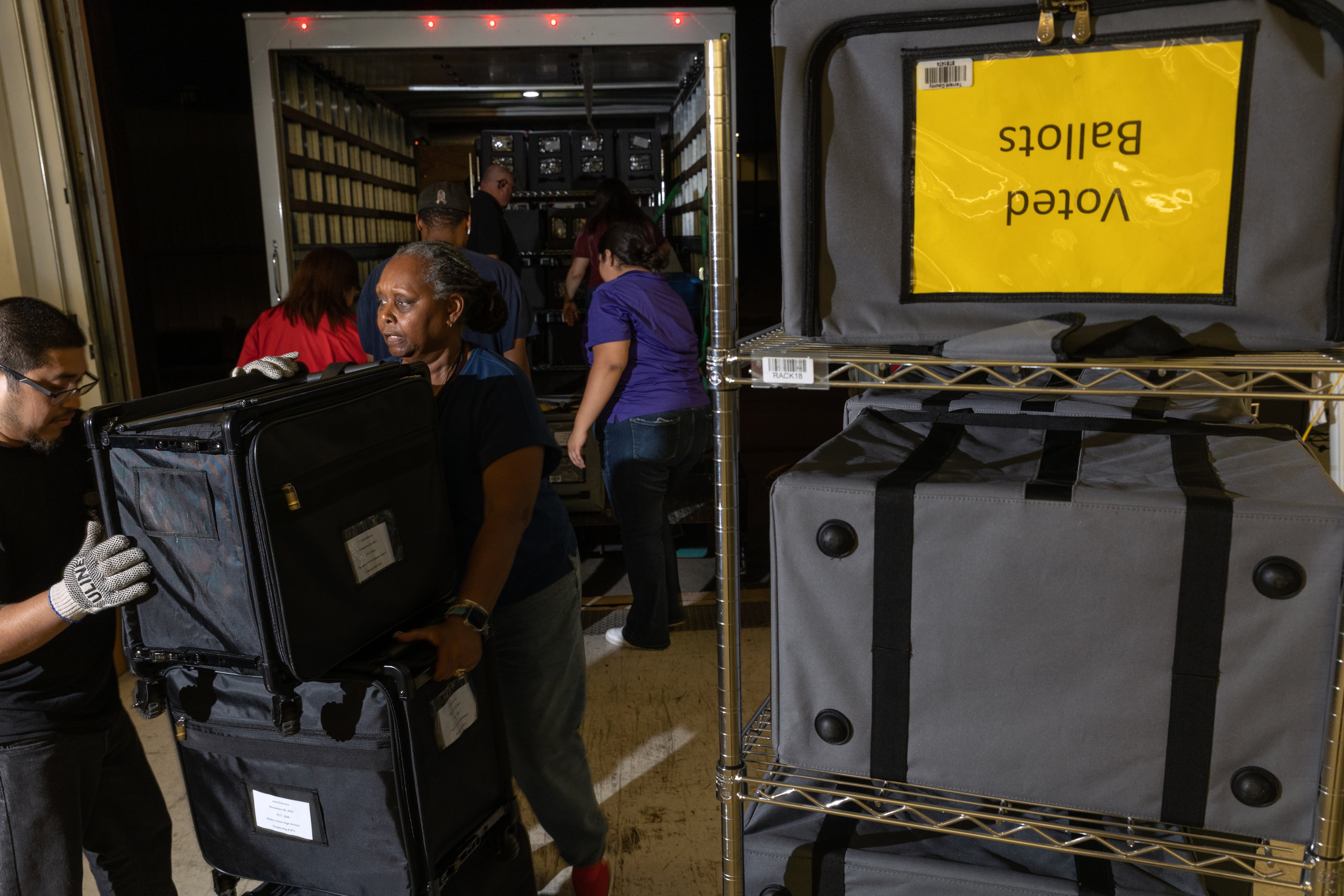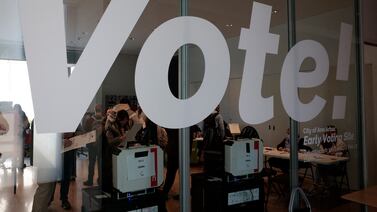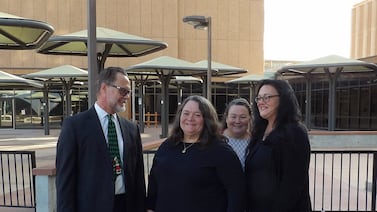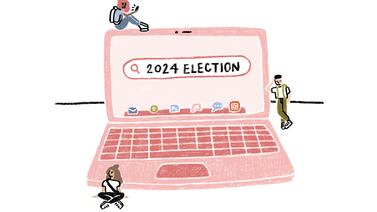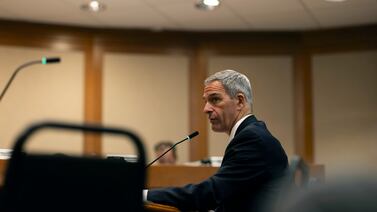Votebeat is a nonprofit news organization reporting on voting access and election administration across the U.S. Sign up for our free newsletters here.
Update, June 1, 2023: The Texas House and Senate approved the final version of the bill during the closing days of the legislative session. It is now headed to the governor’s desk to be signed into law.
The Texas House of Representatives gave crucial approval on Tuesday to a Republican-backed effort rooted in conspiracy theories that would remove the state from a national coalition that helps prevent voter fraud.
Senate Bill 1070, authored by state Sen. Bryan Hughes, was approved by the House on a 85-61 vote. The bill would allow Texas to withdraw from the Electronic Registration Information Center, also known as ERIC, a multistate program used for checking duplicate voter registrations and cleaning voter rolls. The bill is now headed back to the Senate for approval of changes proposed by Rep. John Bucy, D-Austin, that would add requirements to comply with federal and state privacy guidelines if an alternative system is contracted by the state.
ERIC, considered by election administration experts across the country to be the best tool for preventing double voting across state lines, has been a target of viral conspiracy theories spread since early last year by a fringe conservative publication, The Gateway Pundit. The nonpartisan program compares voter registration rolls from all its member states, along with other data, to flag voters who have died, moved away, or registered elsewhere so that states can remove outdated registrations from their rolls.
Rep. Chris Turner, D-Grand Prairie, spoke against the bill Tuesday and said it was concerning to see the Texas Legislature take such action based on a conspiracy theory.
“That’s why I don’t understand why we have this bill before us, particularly when we know the data shows that ERIC has helped Texas identify duplicate registrations, and that’s exactly what we should be trying to do,” Turner said.
Right-wing activists and conservative media have falsely said that the program is led by left-wing activists, that its funding comes from Democratic megadonor George Soros, and that it shares voters’ private data with outside groups seeking to give Democrats an advantage, among other allegations. Since last year, eight Republican-run member states — most recently Virginia — have announced their withdrawals, apparently due to political pressure.
In a written statement to Votebeat, ERIC executive director Shane Hamlin said the program has provided the Texas secretary of state with reports identifying more than 900,000 out-of-date or inaccurate voter records. “Consistent with ERIC’s mission, these reports enhanced Texas’ ability to maintain accurate voter rolls,” Hamlin said Tuesday. “ERIC will continue to support Texas’ active use of its membership.”
In Texas, an “ERIC task force” was created more than a year ago by members of the Texas GOP, ignited by those same viral false claims. The task force was spearheaded by the party’s vice chair, Dana Myers, and Alan Vera, then the Harris County GOP ballot security chair. Vera, an influential activist who spent decades raising questions about voter fraud and is also known for challenging thousands of voter registrations in Harris County, drafted language for a bill and submitted it to Hughes’ staff in January. A month later, Hughes and Rep. Jacey Jetton, R-Richmond, filed bills incorporating the suggestions from Vera and the task force.
Vera died at the Capitol earlier this month, moments before he was scheduled to testify on election legislation. Jetton on Monday renamed SB 1070 “The Alan Vera Memorial Act.”
Texas law requires the state to participate in a multistate data-sharing program to clean its voter rolls, and the state has been a member of ERIC since 2020. The Texas Legislature budgets about $1.5 million to participate in the program. About $115,000 of those funds pay for annual fees to use ERIC’s voter-matching data. The rest of the funds go to paying for postage, mailing, and printing costs to send notices to residents ERIC identifies as eligible voters who are not yet registered, an effort the program requires of its member states.
Members of the ERIC task force argued the state was spending too much money on the program and suggested Texas could instead use private-sector alternatives. Members of the ERIC task force also pushed for the state to stop spending funds on such mailers for eligible voters.
Hughes’ bill directs the secretary of state to build its own version of a multistate cross-check program or to find a “private sector provider” with a cost that won’t exceed $100,000.
In March, the secretary of state announced it was taking steps to build its own version of the program and researching viable options in the private sector. Votebeat reported those efforts could stall or take years.
The bill nonetheless requires such a system to identify voters whose addresses have changed, who have died, or who are ineligible to vote, including because they have been convicted of a felony. Lastly, the bill also requires that a contract with the private sector provider “may not require any additional duty of the state” that isn’t listed in the legislation — such as the mailers to unregistered but eligible voters that ERIC requires its member states to send.
Bucy proposed changes to the bill that election policy experts say are “guardrails” on systems that could potentially replace the program.
Bucy’s amendment strikes language in the bill that seeks to identify “voters who have been convicted of a felony; and who are not eligible to vote including a felony conviction” and changes it to “voters who are ineligible” under the state Election Code. The amendment also now requires any system the state uses to comply with federal and state laws relating to the protection of personal information.
The changes, which would have to be approved by the Senate before the bill goes to Gov. Greg Abbott’s desk, also say the secretary of state may not contract with a private-sector system unless the contractor requires a background check for its employees. Such a system must also use data from the National Change of Address database to screen for voters who have moved.
“Adding that extra component of verification beyond whatever this mystery vendor might provide is probably a good change,” said Daniel Griffith, senior policy director at Secure Democracy USA, who added that the requirements could help with the state obtaining more accurate information. “But the question is now whether the Senate will accept those amendments.”
Natalia Contreras covers election administration and voting access for Votebeat in partnership with The Texas Tribune. Contact Natalia at ncontreras@votebeat.org.

